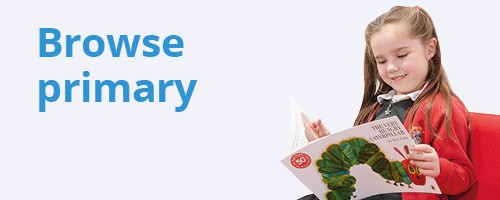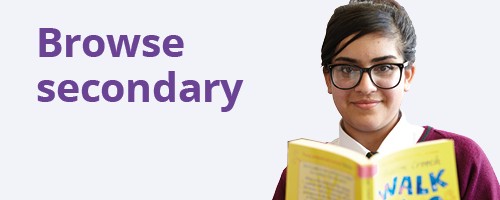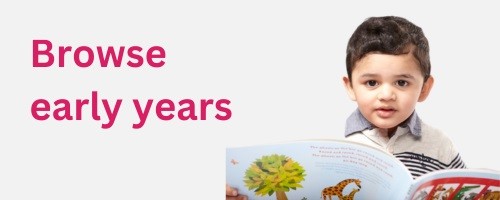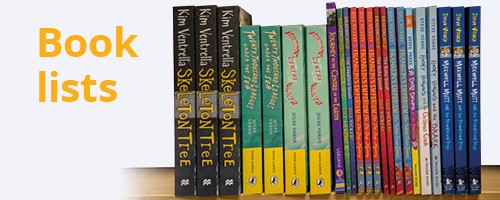Schools please note: due to the summer holidays we will automatically hold all school books and furniture orders due between Wednesday 16 July and Monday 1 September 2025. Delivery will resume from Tuesday 2 September 2025. If your school remains open for deliveries during the summer and you would like to receive your order during this time, please get in touch in advance by calling 0121 666 6646 or emailing hello@peters.co.uk.
For help, advice and telephone ordering call our team on 0121 666 6646
Are you sure you wish to delete this basket?()
This action cannot be undone.
Sorry, something went wrong
Please report the problem here.
Q&A with CKG 2021 Judge Akbar Ali

February 15th 2021
Akbar Ali has worked for Hillingdon Libraries in West London for 10 years, running fun, creative events, storytimes for families and babies, storytelling activities and Summer Reading Challenge assemblies at local schools.
Having grown up with Bengali immigrant parents who spoke little English, access to books wasn’t always easy. Akbar entered the world of books and reading independently at high school, and not through the bedtime story route. He is passionate about libraries and why they are so relevant to local communities. They play an important role in providing lifelong learning for everyone. Akbar’s other love is illustration, having studied it at university, and alongside his job at Hillingdon he is also a designer at Dovetown, a creative collective and music label.
We caught up with Akbar to hear how he came to be a judge for the Carnegie and Kate Greenaway Awards, and find out a bit more about the judging process.
Q: What inspired you to become a judge for the Carnegie and Kate Greenaway awards?
I really appreciate how the awards champion the joy of reading and the impact it can have on a child's upbringing. It's also nice to know that there are people out there who work with books who are just as mad as I am about them - bits of paper stuck in between two bits of card with a hint of magic.
Q: The Carnegie and Kate Greenaway awards are unique in that they are the only awards to be solely judged by children’s librarians. We all know that children’s librarians are crucial - what is it that makes the children’s librarian role so important?
I feel we are in a great position to encourage the sharing of stories and books to everyone. The spectrum of people we come across is wonderful. Many families do not understand or have access to the benefits of books. Libraries are often community hubs and provide a wealth of vital services to the residents they serve. We can address individual needs by striking up a conversation, asking the right questions, providing relatable material and welcoming children back to the library again and again. Events that are run in libraries inviting families and children are a great way for parents to meet other parents. Children can learn to share, socialize and gain confidence at their own pace in a non-judgmental environment.
Q: You grew up with parents who spoke little English, so access to books wasn’t always easy. How did this experience growing up shape your view on the importance of libraries and the value of reading for pleasure?
Access to books means a lot to me and I try not to take it for granted. It really has informed the way I try to encourage families to share books together and to foster bonds. Children that have the opportunity to pick their own books will often have opinions about them and will happily tell you what they liked about a book or what themes they like finding books about. It’s the choice that you give them that enables them to find the joy of reading. They slowly learn the value of books as families return to the library seeing how their children are enjoying themselves. For some families it becomes a daily ritual. They visit after school, pick some books about dinosaurs and go home to read together in comfort. That’s when you know you are doing something right.
Q: Tell us a bit more about the work you do at Hillingdon Libraries to help engage children in the local community with books and reading. What do you enjoy most about your role?
Hillingdon has been great. We have several libraries that the communities can access. Staff are professional but more importantly friendly and approachable. Storytime's are a great time to have interactions with families. Often parents will bring their young children and the grandparents would accompany them, which means we are having conversations with multiple generations all in one place. Working with Booktrust we gift Bookstart packs which are a great ice breaker and great way to start a family off on their journey in discovering the joy of reading together as a family. The libraries are often brimming with children during the summer holidays when we are running the Summer Reading Challenge. This is usually when reading levels can drop drastically and the challenge really helps to motivate them.
The recent pandemic has affected everyone's lives and we have found ways to still provide a vital service to families. Storytelling has become even more important now. It has become a way to access important information and a means to cope with the daily stresses. We have run Zoom Storytime sessions for families and young children so that they can still enjoy a regular storytelling event. Social media has also been vital. We have created virtual library tours, craft videos, recorded storytelling (following publisher guidelines) and created quizzes and activity sheets that are posted regularly for families to access. We have been promoting a lot of online resources as well like Borrowbox. Libraries have stepped up to the challenge and delivered amazingly.
Q: The Kate Greenaway Award celebrates the best illustrations in children’s books. You’re also an illustrator and designer yourself – how do the best illustrations work to capture children’s attention and imagination to get them hooked?
I am so pleased that the awards understand how illustration enhances reading and storytelling. Good illustration considers its audience's needs, hopes and experiences.I cannot remember seeing myself in a book when I was a child. It's quite a strange thought but it shows how representation in picture books is important and it is something that is slowly being addressed. Illustration often plays with the reader’s experience of the story through layering the narrative and creating the overall aesthetic of the physical book. It works with text rather than parrot the same thing. You can have illustration as text itself, so the words almost come alive, conveying emotion and creating a certain atmosphere. It presents new ideas to the reader and allows them to play with unfamiliar perspectives.
Q: How are you finding the judging process for 2021? How do you fit in all the reading?
It's my first CKG judging role and it’s a great learning experience. It has given me the time to think critically about children's books and find new gems. Past judges who are taking part again have been absolutely amazing and so friendly. Their knowledge is astounding. You find out all the things they do for their libraries. The Lockdowns have made it difficult to meet in person but it has given us even more resolve. It's quite daunting seeing all those books that need to be judged. I’ve been having to somehow find space for all of them, under beds, back of wardrobes and piles on the floor. I tend to get a lot of my reading done in the evenings in bed after a long day at work. When I am at work, you’ll find me with a book during my breaks and lunch. So, there’s always a book on me wherever I am.
Q: What’s your favourite children’s book? (Or is it too difficult to choose just one?)
It’s never just one! 'Owl Babies' by Martin Waddell, illustrated by Patrick Benson is an absolute go to for my Storytimes at the library. Poor Bill only wants his mummy back. The line ‘I want my mummy!’ is repeated throughout the story creating a familiar rhythm. ‘On a Magical Do-Nothing Day’ is written and illustrated by Beatrice Alemagna. It is about a child who has to ditch their electronic device and go explore the big wide world outside. The illustrations are very immersive and you can almost smell the moss, trees and soggy leaves on the soil. 'Beegu', written and illustrated by Alexis Deacon has always been a favourite. A lonely yellow alien who has found themselves stranded on Earth, amongst the humans. It finds that the grownups aren't particularly friendly, but the kids are alright.
The Carnegie and Kate Greenaway longlists will be announced on Thursday 18th February 2021.
Pre-order your longlist or shortlist book packs here.









